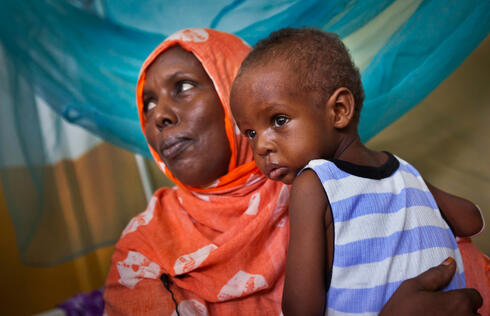Dozens of meetings and hours of discussions have taken place at UN headquarters since the war began regarding the humanitarian situation in the Gaza Strip. While Israel has acknowledged the situation is exceptional and difficult, an examination of UN World Food Programme data against UN discussions reveals staggering disparities between the severity and scope of the crisis and the Security Council’s disproportionate focus on it.
7 View gallery
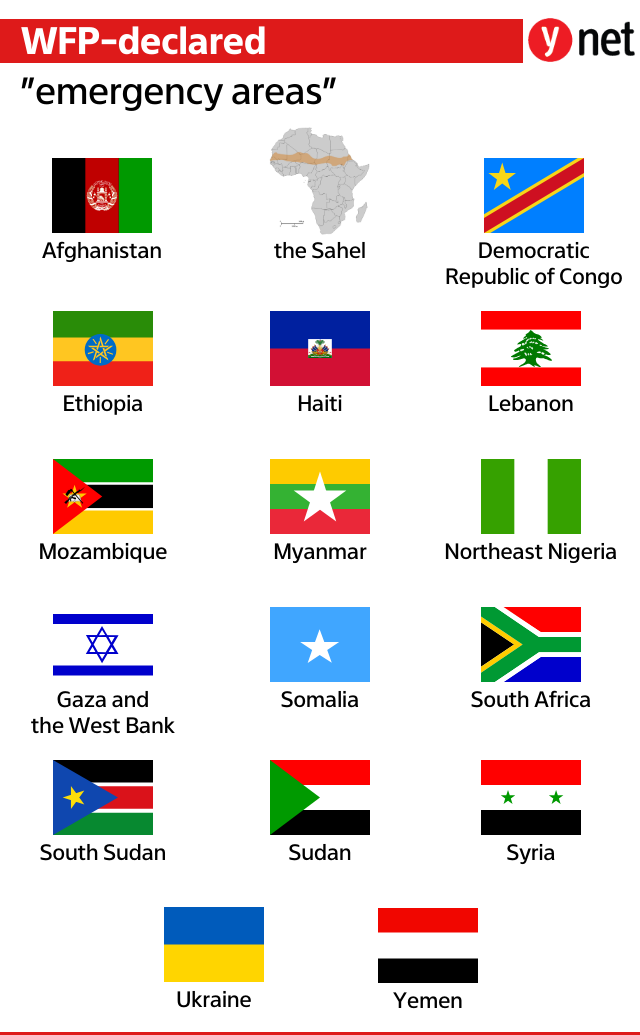

WFP declared emergency areas
7 View gallery
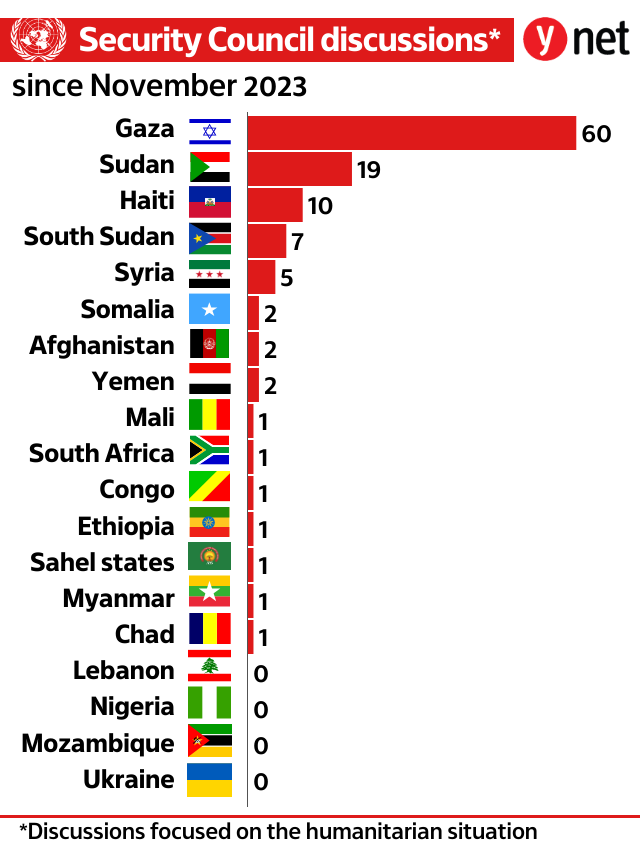

Security council discussions since November 2023
The UN’s World Food Programme operates in 120 countries worldwide, including 17 designated as “emergency” situations — among them “Palestine.” According to the data, 5.5 million Palestinians live in Gaza and the West Bank, with an estimated 640,000 facing starvation. This compares to approximately 215.9 million people at risk in other countries designated as “emergencies.” Beyond emergency cases, dozens of additional countries house hundreds of millions of people at various risk levels where the World Food Programme also operates.
The World Food Programme says $334 million is needed this year for required operations in Gaza and the West Bank. This emergency situation greatly preoccupies the UN Security Council: since November 2023, the UN Security Council has held at least 60 discussions on the humanitarian situation in Gaza, during which serious acusations were leveled against Israel. This is more than three times the discussions of the second-ranked location, Sudan, where the Security Council has discussed the emergency situation only 19 times — despite Sudan’s more severe conditions affecting 38.4 times more people (approximately 24.6 million out of a population of about 50 million).
7 View gallery
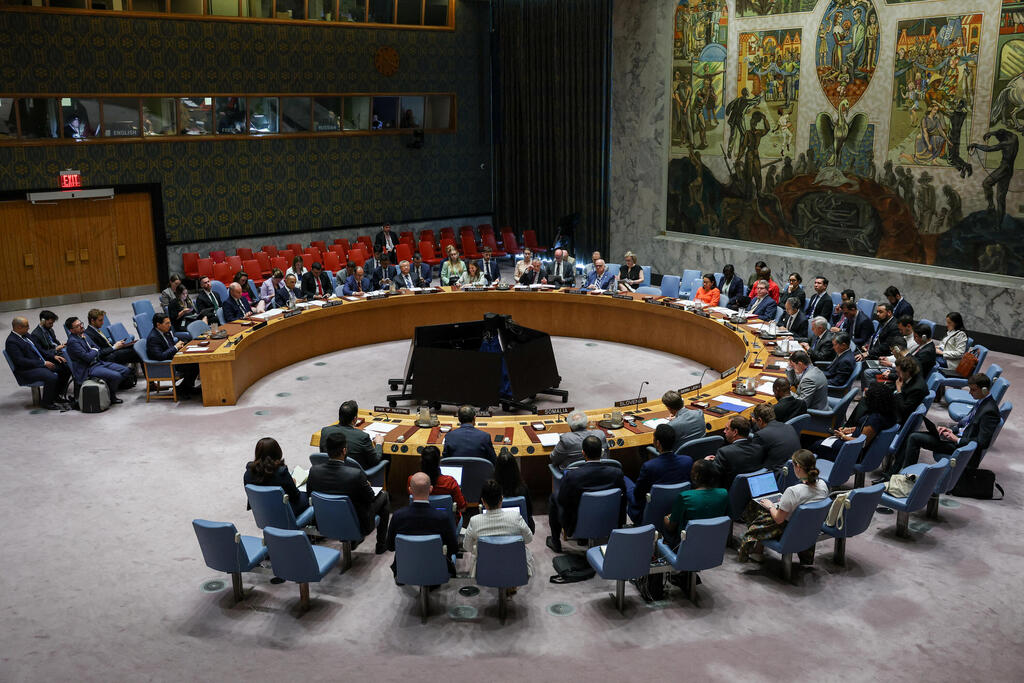

United Nations Security Council (UNSC)
(Photo: REUTERS/Kylie Cooper)
This is also six times more than Haiti, where conditions are alarming: 5.7 million face acute hunger out of a population of approximately 11.77 million, yet Haiti ranks third with 10 discussions over the past two years.
What about the 14 additional countries that, according to World Food Programme data, face significantly more severe “emergency” situations affecting far more people? Apparently, this matters less to the international community.
7 View gallery
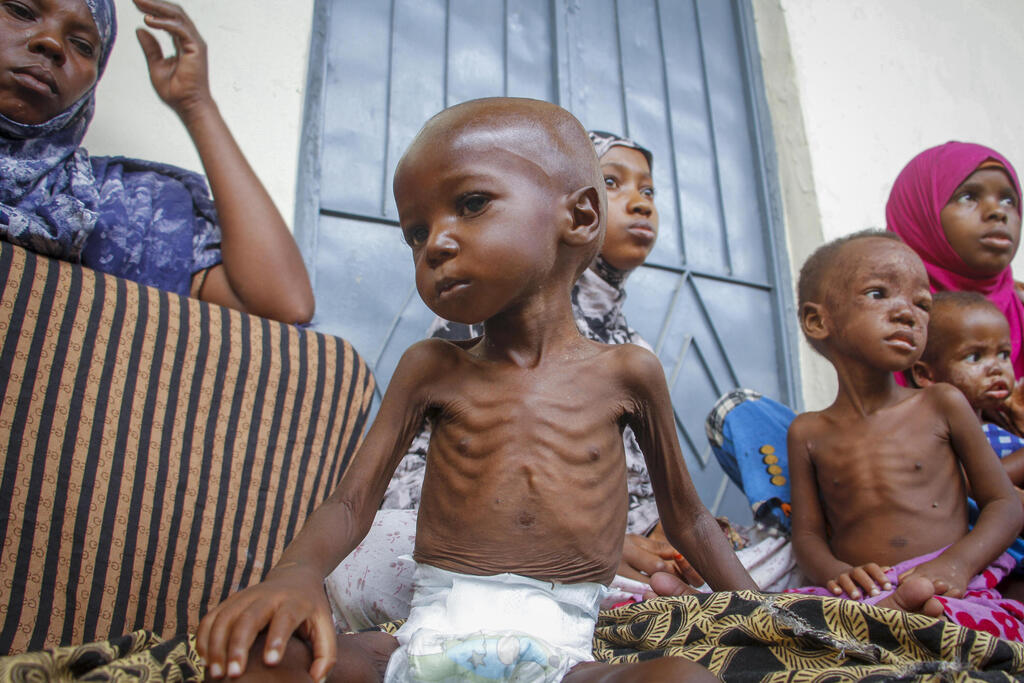

Somalia famine, food crisis, malnutrition treatment center, Mogadishu
(Photo: AP )
One need not look far to find UN hypocrisy in its different treatment of countries — even those bordering Israel are designated as “emergencies” but haven’t received attention at UN discussion tables. In neighboring Lebanon, for example, out of approximately 5.8 million residents, 2.5 million need UN support in the coming year, and more than one million are “struggling to put food on the table.” To address Lebanon’s crisis through at least the end of this year requires more than $200 million, according to the World Food Programme. Despite this “terrible emergency,” the UN Security Council hasn’t discussed Lebanon’s humanitarian emergency in two years.
Syria’s emergency situation received some Security Council attention — but only five times since November 2023. This despite serious data showing more than nine million people in Syria suffer from food insecurity, with 3.6 million additional people supported by the World Food Programme last year. Now, $335 million is needed to restore World Food Programme operations in Syria this year.
7 View gallery
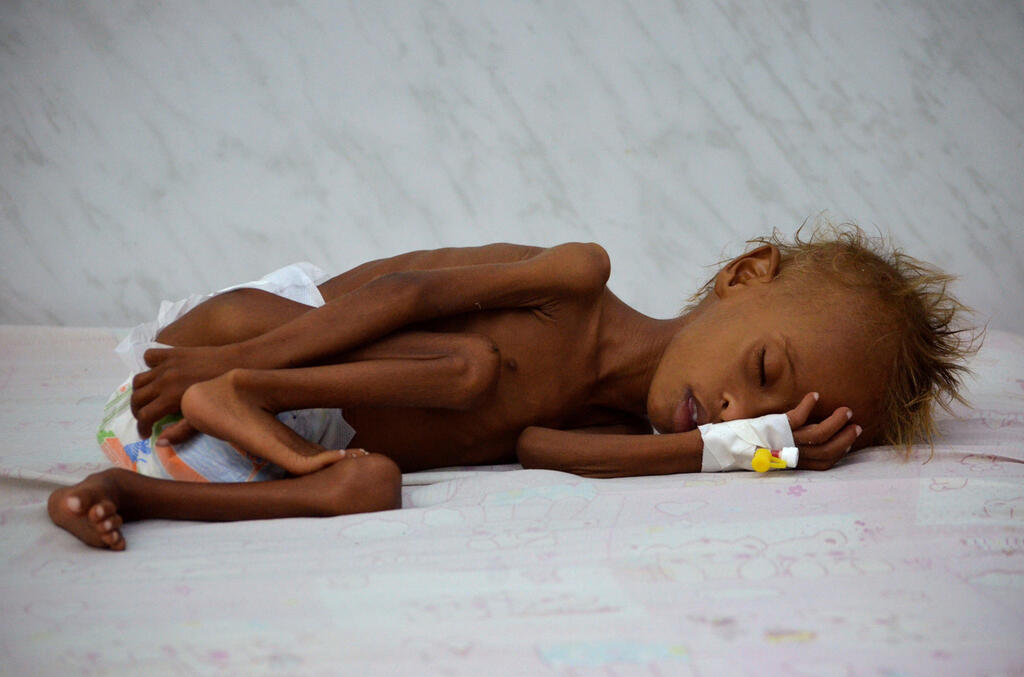

In Yemen, where the Houthis actively participated in the war against Israel, the “emergency” affecting approximately 40 million residents is far more severe and significant. World Food Programme data shows more than 17 million people suffer from food insecurity and 19.5 million need humanitarian assistance. Funding World Food Programme activities for the next two months requires $577 million. Yet this serious situation occupied the Security Council only twice in the past two years.
In Ukraine, which has been at war with Russia for more than three and a half years, an “emergency” exists. Five million people need food and livelihood assistance, with an additional one million supported monthly by the World Food Programme. Continuing World Food Programme operations in Ukraine this year requires an additional $270 million. Yet Ukraine’s acute humanitarian situation apparently hasn’t occupied the Security Council in the past two years, possibly due to sustained U.S. and Western support.
The countries in the most severe situations according to the UN World Food Programme are Sudan, South Africa, Nigeria and the Democratic Republic of Congo. In Sudan, 24.6 million people suffer from acute hunger, with two million additional people facing starvation or famine risk. Continuing to fund operations there for the next three months requires $645 million. South Africa, which sued Israel at The Hague, faces equally dire conditions: 21 million children suffer from malnutrition, and 27 million people face food insecurity. Given the serious situation, the Security Council has discussed South Africa— once in the past two years.
7 View gallery
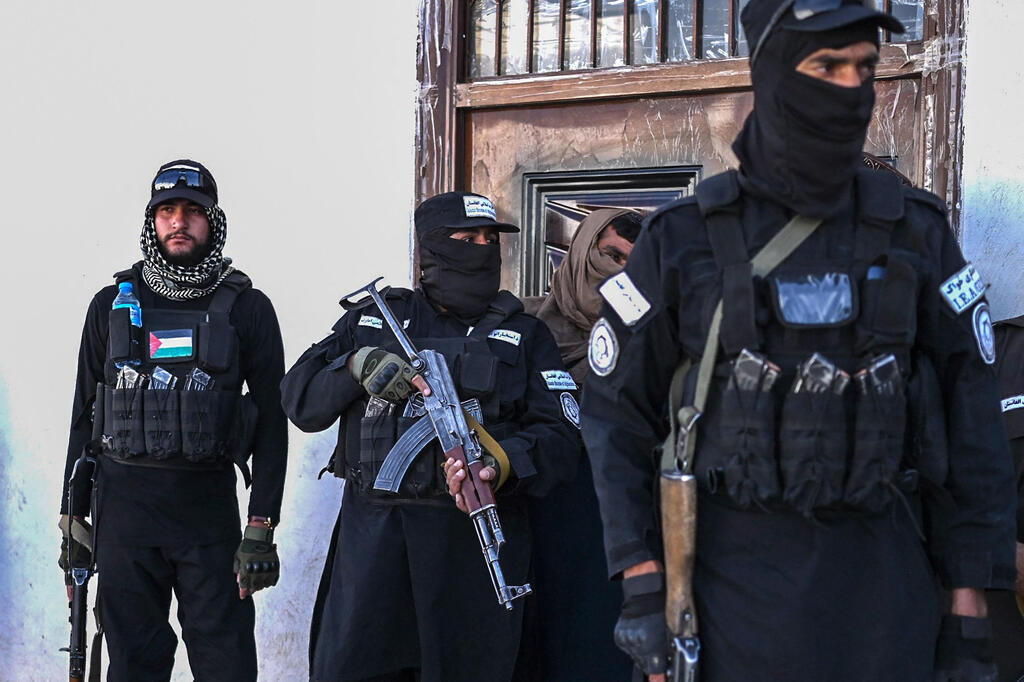

Taliban security forces, Afghanistan, at the Islam Qala border crossing, where Afghan refugees and migrants were deported from Iran, June 28.
(Photo: Wakil Kohsar / AFP)
A serious “emergency” was also designated in Nigeria, where 30.6 million people in the northeast suffer from “acute food insecurity.” Additionally, 2.3 million people were displaced from their homes in northeastern Nigeria due to violent conflicts. Yet this troubled the Security Council less over the past two years.
In the Democratic Republic of Congo, according to the World Food Programme, 28 million people suffer from “acute food insecurity.” Beyond them, nearly five million children under 5 face or are expected to face acute malnutrition. Continuing operations there for the next two months requires $433 million. Consequently, they also received one formal Security Council discussion.
Myanmar, Ethiopia, Afghanistan and Sahel region countries in Africa also face significant “emergency” hunger situations. In Myanmar, 16.7 million people suffer from food insecurity, an issue that troubled the UN Security Council only once in the past two years. The Council also addressed Ethiopia only once, despite more than 10.2 million people suffering from “acute food insecurity,” with the World Food Programme supporting 3.5 million people last year. To continue providing “life-saving assistance and strengthen resilience” this year, the World Food Programme needs $150 million.
In Afghanistan, taken over by the Taliban just two years before October 2023, the numbers are significant. Out of approximately 42.65 million residents, 9.5 million suffer from acute food insecurity, with nearly 5 million women and children needing malnutrition treatment. Continuing operations until February 2026 requires $568 million “urgently.” Afghanistan’s situation has occupied the Security Council twice since October 2023. In Sahel countries, 10 million people suffer from “acute hunger,” and the World Food Programme needs $620 million to continue operations. The Council discussed the situation there once in the past two years.
Haiti, Mozambique, Somalia and South Sudan also entered the World Food Programme’s “emergency” list. According to UN World Food Programme data, 5.7 million people in Haiti face “acute hunger.” Additionally, the program assisted 1.7 million people during the year and needs $46.4 million to continue operations there next month. Haiti ranks third in Security Council discussions with 10 discussions over two years — minimal attention compared to Israel’s 60 discussions.
7 View gallery
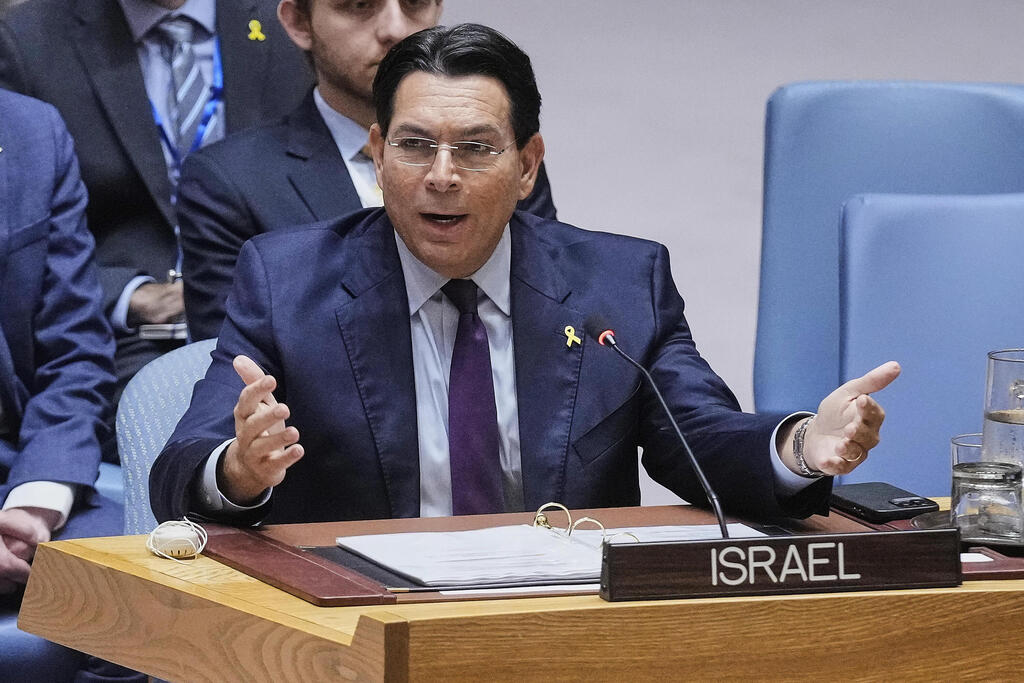

Danny Danon
(Photo: AP Photo/Richard Drew)
In Mozambique, five million people suffer from food insecurity, requiring $147 million for “emergency response” through next month. Somalia occupied the UN twice, where 4.6 million people suffer from “high levels of acute food insecurity,” and 1.8 million children under five suffer from acute malnutrition. Continuing operations through year-end requires $266 million. In South Sudan, 7.7 million people face acute food insecurity, with famine threats in two provinces. World Food Programme operations there need $274 million through year-end. Over the past two years, South Sudan’s situation occupied the UN seven times.
Israeli UN Ambassador Danny Danon said: “Since October 2023, dozens of dedicated UN discussions on Gaza’s situation have taken place, sometimes more than one per week. The scope and intensity of focus on Gaza are unprecedented compared to other humanitarian crises defined by UN agencies themselves as far more severe: in Sudan, Congo, Ethiopia and Yemen, where millions face starvation and death. Virtually no Security Council discussions occurred on these countries’ situations in the past year.”
He added: “Instead of fulfilling its role as an international body that distributes attention equally among crises, the UN chooses to focus obsessively on Gaza in numerous, lengthy discussions that always present a one-sided picture blaming Israel while completely ignoring Hamas’s responsibility. This isn’t universal humanitarian concern but cynical use of the UN to serve political purposes.”

